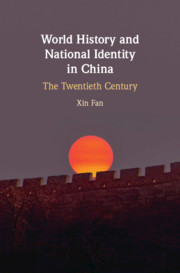Book contents
- World History and National Identity in China
- World History and National Identity in China
- Copyright page
- Dedication
- Contents
- Figures and Tables
- Preface and Acknowledgments
- Introduction: Control and Resistance
- 1 The Confucian Legacy
- 2 The Cultural Destiny
- 3 Becoming the “World”
- 4 The Forced Analogy
- 5 Imagining Global Antiquity
- Conclusion: World History and the Value of the Past
- List of Characters
- Bibliography
- Index
2 - The Cultural Destiny
Nationalism and World History in Republican China
Published online by Cambridge University Press: 19 February 2021
- World History and National Identity in China
- World History and National Identity in China
- Copyright page
- Dedication
- Contents
- Figures and Tables
- Preface and Acknowledgments
- Introduction: Control and Resistance
- 1 The Confucian Legacy
- 2 The Cultural Destiny
- 3 Becoming the “World”
- 4 The Forced Analogy
- 5 Imagining Global Antiquity
- Conclusion: World History and the Value of the Past
- List of Characters
- Bibliography
- Index
Summary
The early Republican period in Chinese history witnessed the emergence of a new generation of academic professionals. These new professional historians criticized the centrality of ancient historical time in Chinese historical studies. In contrast, they embraced objectivity as a goal of historical practice and regarded intellectual autonomy as integral to the discipline. With the shift in focus of historical studies, in the 1920s, some new academic professionals carved out a niche for themselves by developing world history into a specific teaching field. By the early 1930s, world historians such as Lei Haizong dedicated themselves to placing China’s past and future within a world-historical context. This chapter contends that the pursuit of intellectual autonomy was, however, interrupted by the war with Japan. At this moment of crisis, world historians exemplified by Lei Haizong became increasingly nationalistic. These historians glorified the unique nature of Chinese culture to promote national identity at a moment of crisis. As a result, a binary opposition between China and the world gradually emerged in Chinese historiography.
Keywords
- Type
- Chapter
- Information
- World History and National Identity in ChinaThe Twentieth Century, pp. 50 - 85Publisher: Cambridge University PressPrint publication year: 2021

